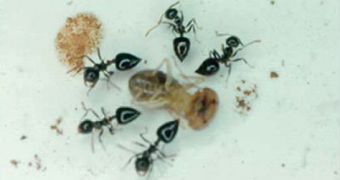A common species of African ant was recently discovered to prefer fighting long-range, rather than melee. The insects are able to deploy a venomous vapor from their stingers, which is deadly even from a great distance.
In a study conducted in Cameroon, investigators witnessed a battle between 15 ants of the Crematogaster striatula species and a single termite. In close-quarters combat, the termite would have made short work of the much-smaller ants.
However, the ants adopted a tactic experts had never seen before. They actively steered clear out of the termite's path, while at the same time spraying the venomous vapor in its general direction. All members of the group did so in formation.
Even as the termite was beginning to trash, the ants did not approach. Instead, they simply waited at a distance until the termite died. They then grabbed it, as evidenced by the image above, and carried its husk to their nest.
Even though researchers discovered this capability only now, other insect species seem to be well aware of it. Members belonging to other species of ants were afterwards observed while they were dropping everything and running away, when confronted with a C. striatula individual.
The same reaction was not observed when the dangerous ants' stingers were obviously depleted of the dangerous substance. Some of the retreating ants the experts noticed even discarded whatever they were carrying at the time, so they could make a run for it.
Details of the study appear in a paper published in a recent issue of the peer-reviewed scientific journal PLoS ONE, which is edited by the Public Library of Science. This is one of few instances were ants are observed as fighting unfairly.
Conceivably, a well-organized group of C striatula could wreak havoc in colonies belonging to other species, by simply spraying their venom through the hive's entrances, and waiting for the bulk of enemy soldiers to die out before engaging them in direct combat.
According to the team that conducted the work, the new finding could be used for the creation of advanced pesticides, which would be based on the active molecule that makes the ants' venom so effective, ScienceNow reports.

 14 DAY TRIAL //
14 DAY TRIAL //